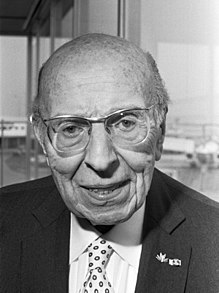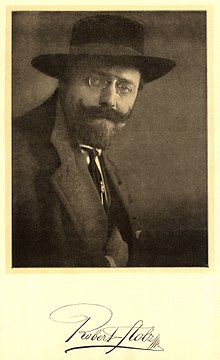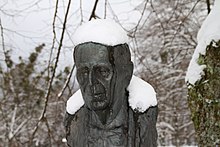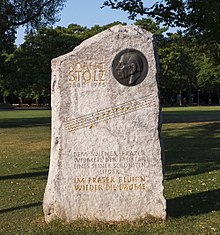Robert proud
Robert Elisabeth Stolz (born August 25, 1880 in Graz , † June 27, 1975 in Berlin ) was an Austrian composer and conductor .
Life
Robert Stolz was the twelfth child of the composer and music director Jakob Stolz and his wife Ida Stolz , nee. Bondy, a pianist and music teacher. He studied music in Graz, Berlin and Vienna. In 1896 he passed the state examination for music. In 1897 he became opera coach at the Graz Municipal Theater , then Kapellmeister in Marburg an der Drau and in 1902 at the Salzburg City Theater .
There he made his debut as a composer on March 3, 1903 with the operetta Schön Lorchen . After an engagement at the Deutsches Theater in Brno - he conducted his farewell performance on May 29, 1907 - he was musical director at the Theater an der Wien from 1907 to 1917 . From 1914 to 1918 he did military service, including as Kapellmeister in the Kuk Infantry Regiment Hoch- und Deutschmeister No. 4 . During his activity as musical director at the Theater an der Wien, he also conducted premieres of musical stage works by contemporary composers. This included the world premiere of the operetta Der Graf von Luxemburg by Franz Lehár on November 12, 1909.
When his attempt to set up his own theater failed due to the immense costs imposed by official requirements, he went to Berlin in 1924. In 1925 the comedian's operetta Märchen im Schnee was performed here in the cabaret . In 1924, the short-lived Robert Stolz stage opened in Annagasse ( St. Annahof (Vienna) ). From 1926 Robert Stolz lived in Vienna again. He wrote over 60 operettas as well as numerous film music , hits a . a. and is considered the last master of Viennese operetta . Many pieces from his works are known and loved to this day, e.g. B. In the Prater bloom again the trees , Salome , Auf der Heide bloom the last roses , In my Father's house is a lime tree , the whole world is sky blue , My Love Song must be a waltz , bye, my little Guards officer , Vienna becomes beautiful only at night etc. His excursions into serious music remained the one-act opera Die Rosen der Madonna and his song cycle 20 Flower Songs (op. 500).
After the National Socialists came to power in 1933, he secretly took several Jews and politically persecuted people to Austria on 21 trips, hidden in the back of his large limousine. According to his own statements in 1938 (according to others not until 1939), after Austria's "annexation" to Germany, he left his home country because of his negative attitude towards National Socialism . As he remembered, he came to Paris via Zurich , from there he emigrated with his now fifth wife, " Einzi ", via Genoa to New York . Thanks to its continued unabated composer Robert Stolz activity was that in the USA the war years spent there during the time of his emigration for a film music Oscar nominated for It Happened Tomorrow ( It Happened Tomorrow , 1944); Stolz was nominated in the “Best Song” category for the song Waltzing in the Clouds , composed for Spring Parade (1941) . On March 28, 1942, he was expatriated from the German Reich and his property was confiscated after he had turned down all offers from the German Reich to return to Germany "in honor".

In 1946 Robert Stolz returned to Vienna and continued his work as a composer and conductor. In 1952 he began to deliver the music for the legendary Wiener Eisrevue . With Die Ewige Eva (alluding to the Viennese figure skating European champion Eva Pawlik ) he created the first of 19 ice operettas . In 1960 he composed and conducted the Austrian contribution to the Grand Prix Eurovision de la Chanson , the song "Du hast mich so fascinated" (Stay) sung by Horst Winter in London.
Robert Stolz was married five times, first with the singers Grete Holm and Franzi Ressel , with Josephine Zernitz , with his fourth wife Lilli and finally in his fifth marriage with Yvonne Louise Ulrich , called "Einzi" (1912-2004), who also worked as a manager up occurred to his death. She had a daughter from her first marriage. After Robert Stolz's death, Einzi founded the Robert Stolz Society, wrote his biography and awarded numerous artists (including: Udo Jürgens , Milena Rudiferia, Hans-Erich Halberstadt and Klaus Eberle, director of the Grazer Salonorchester ) the Robert- Certificate of pride "for great service to the care and promotion of his works".
He was buried on July 4, 1975 with the participation of tens of thousands of mourners in a grave of honor in the Vienna Central Cemetery (group 32 C, number 24) in the immediate vicinity of the presidential crypt. His last wife, "Einzi", rests at his side. She died on January 18, 2004 in Vienna.
Quotes
- "If once the Lord God says, come to me, there is only one thing, the only thing left is what he has given away."
- "When my melodies have found a place in people's hearts, then I know that I have done my job and have not lived in vain!"
Works
Stage works
- 1901 - Student sulk (first performance on March 21 in Marburg an der Drau (Maribor) in the city theater)
- 1903 - Schön Lorchen (first performance on March 3rd in Salzburg)
- 1906 - Love of maneuvers (first performance in Brno)
- 1908 - The Merry Wives of Vienna (first performance on November 7th in the Colosseum in Brno)
- 1909 - The Commandeuse (world premiere in Vienna)
- 1910 - Grand Hotel Excelsior (world premiere at Theater Erfurt )
- 1910 - Das Glücksmädel (World premiere on October 28th in the Raimund Theater in Vienna)
- 1911 - The Mine King (first performance in Vienna)
- 1911 - The Iron Maiden (world premiere in Vienna)
- 1913 - Du dear Vienna (first performance on January 25, 1913 Vienna, Intimes Theater)
- 1914 - Das Lumperl (first performance in the Wilhelma-Theater )
- 1916 - The Favorite (Operetta, T .: Fritz Grünbaum , Wilhelm Sterk , first performance October 1916 Berlin)
- 1920 - The dance into happiness (world premiere on October 18 at the Komödienhaus in Vienna)
- 1920 - The Roses of the Madonna (opera; premiere on March 1st)
- 1920 - Das Sperrsechserl (first performance on June 1, 1920 in the Wiener Komödienhaus)
- 1921 - Kikeriki (first performance in Vienna)
- 1921 - Die Tanzgräfin (world premiere on February 18 at the Wallner Theater in Berlin)
- 1923 - Mädi (first performance on April 1st in the Berlin theater )
- 1925 - Fairy tales in the snow (first performance on December 1st in Berlin)
- 1927 - One single night (operetta, T .: Leopold Jacobson, Rudolf Österreicher , world premiere on December 23, 1927 at the Carl-Theater in Vienna)
- 1927 - Princess Ti-Ti-Pa (first performance on May 15, 1928 at the Citizens' Theater in Vienna)
- 1930 - Peppina
- 1932 - Venus in silk (first performance in Zurich)
- 1932 - When the little violets bloom (premiere on April 1st in The Hague)
- 1933 - Two hearts in three-four time (The Lost Waltz) (World premiere on September 30th at the Stadttheater Zürich )
- 1934 - Sky-Blue Dreams (Grüezi) (first performance on November 3rd in the Stadttheater Zürich)
- 1936 - Rise and Shine (First performed May 1936, Drury Lane Theater London)
- 1937 - The journey around the world in 80 minutes (world premiere December 22, 1937, Volksoper Vienna)
- 1937 - The sweetest hoax in the world (first performance on December 21, 1937 at the Johann Strauss Theater in Vienna)
- 1938 - Balalaïka (together with Georg Posford and Bernhard Grun) (first performance 1938 Theater Mogador Paris)
- 1941 - Night of Love, premiered January 17, 1941, Hudson Theater, New York
- 1945 - Mr Strauss goes to Boston (world premiere on August 13, 1945 at the Shubert Theater in Boston)
- 1946 - Fate with Music (world premiere on November 24, 1946 at the Apollo Theater Vienna)
- 1947 - Drei von der Donau (based on Johann Nestroy's “Lumpazivagabundus”, world premiere on September 24, 1947 at the Vienna City Theater)
- 1948 - A song from the suburbs (first performance April 19, 1948, Deutsches Volkstheater, Vienna)
- 1949 - Festival in Casablanca (first performance on March 27th in Nuremberg)
- 1949 - Spring in the Prater (world premiere December 22, 1949, Stadttheater Wien)
- 1950 - Carnival in Vienna
- 1951 - The recipe for happiness (first performance on May 1, 1951, Wiener Bürgertheater)
- 1951 - Rainbow Square (World premiere 21 September 1951, Stoll Theater, London)
- 1953 - The play of dear Augustin (world premiere on June 21, 1953, arcade courtyard of the town hall, Vienna)
- 1956 - Little swindle in Paris (premiere on December 31, 1956 at the Theater in der Josefstadt, Vienna)
- 1958 - Viennese café (first performance December 1989 in the State Theater in Breslau, Operettenhaus)
- 1960 - Joie de vivre (first performed May 3, 1961, Oxford)
- 1962 - Trauminsel (world premiere on July 27, 1962, Bregenz Festival, Seebühne)
- 1963 - A beautiful autumn (first performance June 5, 1963, Theater in der Josefstadt, Vienna)
- 1964 - Spring Parade (premiere on March 5th at the Volksoper Vienna )
- 1969 - Wedding on Lake Constance (new version of Himmelblaue Träume (Grüezi) premiere on July 23, 1969, Bregenz Festival, lake stage)
- 1977 - The concert based on the stage play by Hermann Bahr, music from the estate of Robert Stolz, (premiere, Kammerspiele, Vienna).
Songs
- Hello you (December 29, 1911) - Text: Benno Vigny
- Vienna only becomes beautiful at night (1916) - Text: Wilhelm Sterk
- In the Prater the trees are blooming again (1916) - Text: Kurt Robitschek
- It's spring in Vienna - Text: Arthur Rebner
- You shall be the emperor of my soul. (1916) - Text: Fritz Grünbaum and Wilhelm Sterk
- Hello, you sweet bellboy (1919) - Text: Arthur Rebner
- Salome, most beautiful flower of the Orient (1920) (oriental foxtrot) - Text: Arthur Rebner
- Then I'll go out into the Vienna Woods ... (1920) (Waltz) - Text: Alfred Grünwald and Robert Blum
- I want to be your comrade (1930) - Text: Walter Reisch
- The whole world is sky blue - Text: Robert Gilbert
- My love song must be a waltz - Text: Robert Gilbert
- Two hearts in three-quarter time (1930) - Text: Walter Reisch
- The song is over (don't ask why I'm leaving) (1930) - Text: Walter Reisch
- Viennese café waltz
- Adieu, my little guard officer (1930) - Text: Walter Reisch
- I love you
- There is a linden tree in front of my father's house (1934) - Text: Bruno Hardt-Warden
- The last roses bloom on the heather (1935) - Text: Bruno Balz
- Whether blond or brown, I love all women - Text: Ernst Marischka
- A rose blooms at Christmas time ( Christmas rose song ) (1967) - Text: Kurt Hertha
Film music
- 1930: two worlds
- 1930: The song is over
- 1932: The Prince of Arcadia
- 1933: What women dream
- 1935: Heaven on earth
- 1936: One shouldn't go to sleep without kissing
- 1940: Spring Parade
- 1944: It Happened Tomorrow (It Happened Tomorrow)
- 1948: Anni
- 1948: Little melody from Vienna
- 1948: Rendezvous in the Salzkammergut
- 1949: My friend who can't say no
- 1955: The German champions
- 1958: The trees are blooming again in the Prater
Orchestral works
- UN March, op.1275 ( dedicated to the United Nations )
Awards
- 1934 Venice International Film Festival : Grand Medal (Best Music) for Spring Parade
- 1941 Oscar nomination (Best Song category) for the song Waltzing in the clouds from Spring Parade
- 1945 Academy Award nomination (Best Music) for It Happened Tomorrow (It Happened Tomorrow)
- 1946 Professor honoris causa by the Austrian government
- 1947 Citizenship Certificate of the City of Vienna (→ List of Honorary Citizens of the City of Vienna )
- 1962 Grand Cross of Merit of the Federal Republic of Germany
- 1963 Anton Bruckner Ring
- 1964 First honorary member of the Vienna Volksoper
- 1965 Ring of Honor of the City of Graz
- 1968 Ring of Honor of the State of Styria
- 1969 Gold film tape for many years of outstanding work in German film
- 1969 Ring of Honor at the Bregenz Festival
- 1970 honorary citizen of the city of Vienna
- 1970 Letter of honor from the city of Passau
- 1970 honorary citizen of the city of Graz
- 1970 Medal of Honor from the City of Rotterdam
- 1970 GEMA ring of honor
- 1970 Medal of Honor of the City of Jerusalem
- 1970 Austrian Decoration for Science and Art
- 1971 Jerusalem Medal (for helping Jewish citizens to flee)
- 1973 honorary member of the Vienna Volksoper
Honors


Numerous streets and squares in Germany and Austria bear his name. Thus, in 1978 in Vienna, Inner City (1st district), the Opera Ring of Robert Stolz place named after him, in u. a. There is a Robert-Stolz-Straße in Augsburg , Düsseldorf , Nuremberg and Wiesbaden .
In Lower spa gardens of Stuttgart-Bad Cannstatt is his bust; Before the First World War, Pride was a conductor here at times.
There is a Robert Stolz Society in Austria , and Robert Stolz Associations have also been founded in Great Britain, France, Belgium, Australia, Japan, Uruguay and South Africa.
While Robert Stolz was still alive, the American writer Aram Bakhsian jr. to record the memories of Robert and "Einzi" Stolz. During his numerous visits to Vienna he had conversations with the Stolz couple and used them together with tape recordings for his Robert Stolz biography “Servus, Du” (English title “The Barbed Wire Waltz”), which is also available as a paperback under the title “ The whole world is sky blue ”has appeared. However, it has been proven that this work is incorrect in many details and that it was exclusively written by Einzi Stolz from 1946 onwards.
Robert Stolz was honored on numerous postage stamps and special postmarks during his lifetime. Postage stamps with the portrait of Robert Stolz appeared in Austria, Germany (Deutsche Bundespost Berlin), San Marino, Paraguay, Uruguay, Hungary and even in North Korea. The number of special postmarks dedicated to him is hardly manageable and has become a separate topic, the “Robert Stolz Philately”. For many years the “Robert Stolz Trophy for Music Philately” was awarded in England.
The Styrian Brass Music Association awards the Robert Stolz Prize as an award for brass bands that meet certain requirements.
The Vienna Philharmonic opened the New Year's Concert, conducted by Mariss Jansons, on January 1, 2016 with the UN March by Robert Stolz.
In 2020, the city of Graz announced that it would build a museum for its big son by 2021, after an earlier facility that was set up in Stolz's birthplace on Mehlplatz in 1991 has not existed for a long time. The special feature of the new project is the integration of the exhibition into an urban senior citizen facility as a "cross-generational museum".
literature
- Kay Less : "In life, more is taken from you than given ...". Lexicon of filmmakers who emigrated from Germany and Austria between 1933 and 1945. A general overview. Acabus-Verlag, Hamburg 2011, ISBN 978-3-86282-049-8 , p. 488 ff.
Web links
- Works by and about Robert Stolz in the catalog of the German National Library
- Works by and about Robert Stolz in the German Digital Library
- Robert Stolz in the Internet Movie Database (English)
- Robert Stolz at filmportal.de
- Biography Robert Stolz
- Anja Tschierschke, Irmgard Zündorf: Robert Stolz. Tabular curriculum vitae in the LeMO ( DHM and HdG )
- Barbara Boisits: pride, family. In: Oesterreichisches Musiklexikon . Online edition, Vienna 2002 ff., ISBN 3-7001-3077-5 ; Print edition: Volume 5, Verlag der Österreichischen Akademie der Wissenschaften, Vienna 2006, ISBN 3-7001-3067-8 .
- List of stage works by Robert Stolz based on the MGG at Operone
- Viennese Robert Stolz Society
- http://robert.stolz.free.fr/
- Robert Stolz on Filmschlager.de
Individual evidence
- ↑ Eugen Semrau: More than a life - construction and function of the Robert Stolz legend . In: Wolfgang Schaller: Operetta under the swastika - Between acceptable art and “degeneration” . Metropol Berlin, 2007. pp. 179–197, here p. 182. ISBN 978-3-938690-35-2 .
- ↑ http://othes.univie.ac.at/633/1/04-17-2008_0009509.pdf
- ↑ https://ajr.org.uk/wp-content/uploads/2018/02/1980_august.pdf
- ↑ For both see Semrau, p. 184.
- ↑ Semrau, p. 185.
- ↑ Roman Seeliger: The Vienna Ice Revue. A dream faded away . hpt, Vienna 1993, ISBN 3-7004-0680-0 , p. 49 ff .
- ^ Isabella Lechner: Die Wiener Eisrevue (diploma thesis University of Vienna) . Vienna 2008, p. 162 ff .
- ↑ Roman Seeliger: The Vienna Ice Revue. Once Austria's ambassador - today a legend . Ed .: District Museum Vienna-Meidling. Vienna 2008, p. 32 f .
- ↑ Thomas Aigner : Dream factory on the ice . Ed .: Bernhard Hachleitner / Isabella Lechner. Metroverlag, Vienna 2014, ISBN 978-3-99300-194-0 , p. 52 .
- ↑ Mourning in Vienna: Widow legend Einzi Stolz is dead on news of January 28, 2004, accessed on December 25, 2010
- ↑ a b The whole world is sky blue, Robert Stolz, Einzi Stolz, Aram Bakshian, Verlag Lübbe, 1986, ISBN 3-404-61089-X
- ↑ Senior entertainment . Retrieved April 23, 2020 .
- ↑ Discogs
- ^ Robert Stolz memorial plaque on the website of the state capital Stuttgart
- ↑ Semrau, p. 194
- ↑ Guidelines for obtaining the Styrian Panther and the Robert Stolz Prize ( Memento from January 31, 2016 in the Internet Archive ), accessed on December 25, 2010.
- ^ City portal of the provincial capital Graz, Michaela Krainz: A museum for Robert Stolz - city portal of the provincial capital Graz. Retrieved March 10, 2020 .
| personal data | |
|---|---|
| SURNAME | Proud Robert |
| ALTERNATIVE NAMES | Proud, Robert Elisabeth (full name) |
| BRIEF DESCRIPTION | Austrian composer and conductor |
| DATE OF BIRTH | August 25, 1880 |
| PLACE OF BIRTH | Graz |
| DATE OF DEATH | June 27, 1975 |
| Place of death | Berlin |





